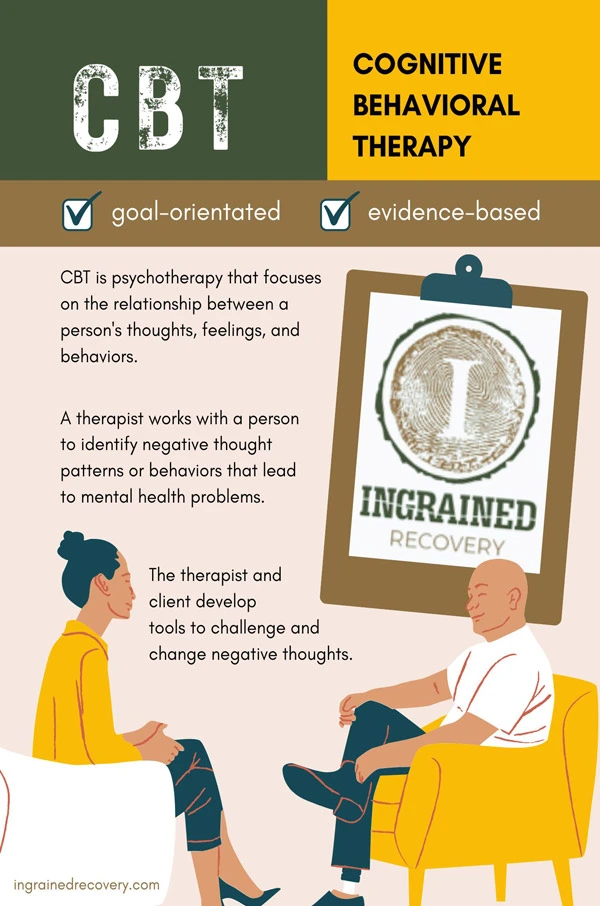Get Help at Ingrained Recovery With CBT for Addiction Treatment
Cognitive behavioral therapists are specially trained counselors who can help people struggling with mental health conditions by converting negative thought patterns into positive thinking. Whether you have post-traumatic stress disorder or substance use disorders, seeking cognitive behavioral therapy in Georgia is a step in the right direction.
Ingrained Recovery, a leader among Georgia recovery centers, provides CBT therapy and a full spectrum of individualized treatments to meet each client’s unique circumstances. We treat the whole person, helping every person we treat end maladaptive behaviors.
To ensure complete healing, we take that a step further, teaching each client about the healthier coping skills that will help them now and throughout all life transitions. Knowing how to manage emotions by using these tools can help each client lead a balanced, healthier lifestyle.
We invite you to read to learn more about how cognitive behavioral therapy (CBT) helps resolve many mental health issues.
Get Effective Treatment Programs at Ingrained Recovery

What Is Cognitive Behavioral Therapy (CBT)?
If you or a loved one struggles with a mental health issue in Atlanta, cognitive behavioral therapy at Ingrained Recovery might be an excellent option for you. This behavioral therapy is an evidence-based psychotherapy that helps you understand how your thoughts, feelings, and behaviors are each connected.
The idea that propelled this therapy into wide use in the 1960s was the recognition that maladaptive thoughts are the root of much emotional distress. This therapy helps clients swap out distorted, negative thinking for logical thinking, leading to healthier emotions. The therapist ensures that the support they provide using this technique is goal-oriented and time-limited.
This treatment is effective for children, teenagers, families, adults, and couples. The broad application of CBT comes from its proven track record in assisting with increasing psychiatric and emotional wellness.
How Cognitive Behavioral Therapists Improve Mental Health Conditions
Ingrained Recovery Clients work with licensed psychologists and therapists on their mental health journey. The therapeutic process is very helpful in learning to develop strategies to cope with many mental health conditions. Here are a few illnesses that benefit from this solution-focused therapy:
Post-Traumatic Stress Disorder and Effective Treatment With CBT
CBT therapy is ideal for most who struggle with post-traumatic stress disorder or PTSD. In individual therapy, clients learn to change the distressing or negative thoughts about their trauma. Cognitive therapy can often reduce PTSD symptoms and improve overall mental health.
Cognitive Therapy and Substance Use Disorders
CBT is incredibly helpful for therapists working with someone to overcome a Substance Use Disorder. The techniques assist them as they identify the negative thought patterns that can lead them to the use of drugs or alcohol. But they also learn how to apply better coping mechanisms as they move forward into a clean and sober life.
Cognitive Behavioral Techniques Can Assist With Eating Disorders
Cognitive behavioral therapy can offer support to people who struggle with anorexia or bulimia. It plays a crucial role as they focus on overcoming a distorted body image. They develop a change in relationships with food as they increase their sense of self-worth, rebalancing their relationship with their own bodies.
CBT Empowers Individuals to Overcome Depression and Anxiety
Negative thought patterns can result in challenges in self-talk, worsening anxiety and depression. Cognitive behavioral therapy (CBT) provides practical exercises that build new skills that help them regain control of their mental health and lessen the impact of their negative emotions and thoughts.

CBT Therapy and Perception of Chronic Pain
CBT practice can help clients understand the connection between negative thoughts and physical chronic pain. It can help treat the pain by changing the inner narrative that leads to the person’s perception, which leads to increased pain and emotional distress.
This understanding of pain management techniques can help those who have developed an overreliance on prescription pain medications.
These five are only a few mental health conditions that benefit from CBT. Others include obsessive-compulsive disorder, bipolar disorder, personality disorder, phobias, and schizophrenia.
Get Proven Detox and Rehab Options at Ingrained

CBT Exercises: Changing Behavioral Patterns and Improving Well-Being
New clients or family members sometimes wonder about methods to change behavior. A therapy professional can use many different evidence-based therapeutic exercises to help cope with anxiety, depression, and substance abuse.
Let’s take a look at some of the most common CBT techniques:
Role Playing Translates into New Life Skills
Under the safe guidance of a therapist, clients prepare for challenges they might face in real life. They build better communication with others, learn to be assertive, and master problem-solving.
Role-playing is a valuable method for both for learning life skills in recovery as well as for relapse prevention and lessening social anxiety.
Cognitive Restructuring Focuses on Challenging Negative Thoughts
Cognitive restructuring can change behavior by asking clients to record their negative thoughts. The client then works with a therapist to identify them and replace them with positive thoughts. This technique is helpful in treating most mental health issues.
Stress Management Strategies for Balanced Emotions
Clients learn mindfulness/relaxation exercises to focus on the present. These activities help those who constantly second-guess past mistakes or worry about the future. Some activities include deep breathing or progressive muscle relaxation. Most report better mental health when they can manage stress.
Activity Scheduling (Especially Helpful for Young Adults)
Young adults face many challenges as they transition from college to the workforce or find their footing in their early careers. These life changes disrupt their comfortable routines, often with insufficient time to adjust.
Activity scheduling helps them create lists of specific tasks or activities, avoid procrastination, and focus on creating structure. It’s helpful in managing behaviors and also restoring a sense of orderliness quickly.
Integration of Other Therapies with Cognitive Behavioral Therapy (CBT)
A therapist will use additional cognitive behavioral therapy techniques, often alongside Acceptance and Commitment Therapy (ACT), which helps the client accept and live with any negative thought they cannot change.
Ingrained Recovery also has a unique opportunity to receive equine therapy, which also integrates well with CBT. Horses are very intuitive creatures with a great understanding of human feelings. Combining CBT and equine treatment can help a person start developing greater emotional control and influence positive behavior.
Ingrained Recovery Can Help Get Cognitive Behavioral Therapy Covered by Insurance

If you need help changing the behaviors and emotions associated with a mental illness, Ingrained Recovery can support you during the sometimes overwhelming insurance pre-authorization process. Our insurance specialist gets answers to your questions about insurance coverage, ensuring you get the support you need.
We work with most major insurance plans, including:
- Aetna
- Ambetter
- Beacon
- Blue Cross Blue Shield
- Carelon
- Cigna
- Evernorth
- GEHA
- GHI (Emblem Health)
- Tricare
- UnitedHealthcare
- and many more.
We also work with private pay clients to deliver care without relying on insurance coverage. You don’t need to come in person. Just give us a quick call, and we start working on getting any necessary pre-authorizations.
Coming to Ingrained from Atlanta, GA and Other GA Cities
Ingrained Recovery is in Eastman, Georgia, on a sprawling campus with upscale amenities. We feel like we’re a world apart. But getting to our treatment center and offerings for cognitive behavioral therapy (CBT) is actually a three-hour drive or less from most GA cities.
Here are some approximate drive times to our location:
- Albany: 1.5 hours
- Athens: 3 hours
- Atlanta: 2.5 hours
- Augusta: 2.5 hours
- Brunswick: 3 hours
- Columbus: 2.5 hours
- Macon: 1 hour
- Savannah: 3 hours
- Valdosta: 2.5 hours
- Warner Robbins: 1.5 hours
If you are coming to Ingrained Recovery from Atlanta, GA, or other cities, you will benefit from the effective CBT treatment and our facility’s calm surroundings.
Those arriving by air can utilize the Heart of Georgia Regional Airport (EZM), located 3 miles from Eastman.
Up To 100% of Rehab Costs Covered By Insurance
Connect With Ingrained for Better Emotional and Mental Health
If you’d like to hear more about how cognitive behavioral therapy (CBT) may help improve your life, call Ingrained Recovery to discuss treatment. Our admissions team can guide you on the next steps to better emotional well-being.
Our therapy team can assist with a host of mental and emotional health concerns, from substance abuse to panic disorders – and we are confident that we can help you get better, too. Contact our helpful, compassionate team today to get the therapy you deserve.
